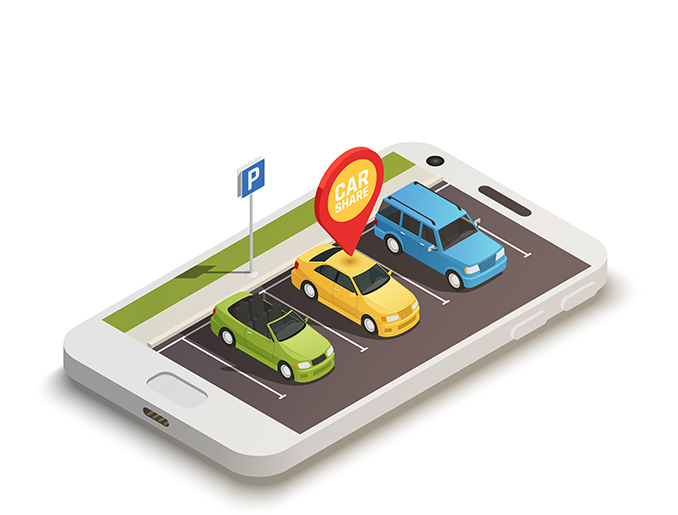Car Sharing
Americans today are looking for the most cost-effective ways to move about. As the average price for a new vehicle continues to increase, car sharing services have become a viable option.
You can think of car sharing as a short-term rental service, enabling you to drive a specific vehicle when and how you need it. And while car sharing has a lot of upsides, there are particular drawbacks you need to consider as well.
Car sharing is distinct from ridesharing in that members are actually driving a vehicle themselves rather than being picked up and driven as is the case with services such as Uber and Lyft. Typically, car sharing is a membership-based service that provides members of a car-sharing organization access to an insured vehicle; gas and free dedicated parking may be included. Four main car sharing models exist: roundtrip, one-way station-based, one-way floating and peer-to-peer (P2P). There is some overlap between the four.

What Are The Types of Car Sharing Services?
Car sharing services come in several types:
Roundtrip car sharing
Car sharing that allows members hourly access to shared vehicles from a dedicated “home” location that must be returned to that same location at the end of the trip. Examples of such services include Zipcar or Enterprise CarShare.
One-way station-based
Car sharing, in which vehicles are returned to a dedicated or reserved parking location. Zipcar offers such a service.
One-way free-floating
Car sharing involves vehicles that do not have to be returned to a specific parking lot but rather parked anywhere within a certain zone. Examples of such services include Car2Go and Zipcar.
Peer-to-Peer (P2P) car sharing
The sharing of privately-owned vehicles in which companies broker transactions among car owners and renters by providing the organizational resources needed to make the exchange possible (i.e., online platform, customer support, driver and motor vehicle safety certification, auto insurance and technology). Examples of such services include Turo and Getaround.
What Are The Advantages?
Car sharing
- Helps you save on gasoline, parking fees, maintenance costs, taxes, vehicle registration, insurance, and various other fixed monthly costs. Those expenses are inclusive in the per-minute or per-hour cost of renting the vehicle.
- Is a practical alternative for those on a budget who don’t necessarily need a full-time vehicle.
- Allows you to choose what you need for specific trips. Need a small car for a quick run to the shopping mall or grocery store? Do you need a larger truck for moving, or an SUV for a family vacation? Many car sharing services and the vehicles they offer are accessible via an app on your smartphone.
Car sharing services are an easy and affordable way to get behind the wheel without buying or leasing the vehicle, or beholding yourself to a preset public transportation schedule.
If you are concerned about carbon emissions and pollution, then consider a car sharing service. You can choose a hybrid or – in some cases – a fully-electric vehicle for your trip.
Car sharing is nothing more than choosing the vehicle you want, and waiting for it to arrive at your home. When you’re done, return the car and that’s basically it.
What Are The Disadvantages?
Car sharing is costly if you need to drive every day. This also holds true if you cover a lot of miles on your typical work day commute. If this is the case, leasing or buying your own vehicle is more economical in the long run.
Car sharing services may sound convenient, but not if you live far away from parking garages or drop-off points.
Peer-to-Peer car sharing allows you to earn money from your own privately-owned vehicle(s). New cars are cheap to run but expensive to buy. Rather than parked in your driveway, at work or in the airport parking lot, your car is available for someone else to rent when you are not using it.
P2P Laws
Peer-to-Peer car sharing companies all have requirements for vehicle maintenance, safety, insurance and mileage in order to qualify to become part of the rental program. You also may be prohibited from listing your car on multiple car sharing platforms. You should contact your insurance company prior to signing up with a peer-to-peer car sharing program because your insurance policy may not cover your vehicle for this type of use.
Maryland and six other states have laws regulating peer-to-peer car sharing. If your vehicle is registered in the state of Maryland, you must abide by Maryland’s peer-to-peer car sharing law (PDF). Here are some requirements:
- You’re prohibited from sharing a vehicle that is more than 10 years old.
- You’re exempt from this rule if you’ve obtained a valid state inspection certificate within 90 days before listing your vehicle.
- You must get a valid state inspection certificate at least once for every 10,000 miles added to your odometer since your prior state inspection certificate was issued.
- You must enter the Vehicle Identification Number (VIN) when you list your vehicle.
- If your vehicle has an open safety recall, you’ll be unable to list the car on a peer-to-peer car sharing platform until you’ve made the necessary repairs. If you receive a safety recall notice, you must remove that vehicle from the platform as soon as possible, but no later than 72 hours after being notified.
- You must not re-list your vehicle until you’ve made the repair.
- If you receive a safety recall notice while a renter has possession of your vehicle, you must notify the peer-to-peer car sharing program and your renter of the recall as soon as possible, and in no event later than 72 hours from receiving the notice.
- You must not re-list your vehicle until you’ve addressed the recall notice.
- The peer-to-peer car sharing program shall notify the shared vehicle owner that, if the shared motor vehicle has a lien against it, the use of the shared motor vehicle through a peer-to-peer car sharing program, including use without physical damage coverage, may violate the terms of the contract with the lienholder.
Additionally, Maryland requires peer-to-peer car sharing platforms to collect a car sharing tax from renters whose trip begins or ends in Maryland. The tax applies to the full trip cost, except deposits, protection plan, and delivery.
In the age of COVID-19 you may want to weigh the risks of sharing your car and the costs of cleaning and sanitizing the vehicle after each use. Also, the additional maintenance costs from the additional use and to keep the vehicle in good condition to meet the standards required by the peer-to-peer car sharing program, versus the income you will make. Also, car thieves are using the Apps to locate cars to steal. The Office of The Attorney General for the District of Columbia put out a consumer alert about the issue in February 2020.
